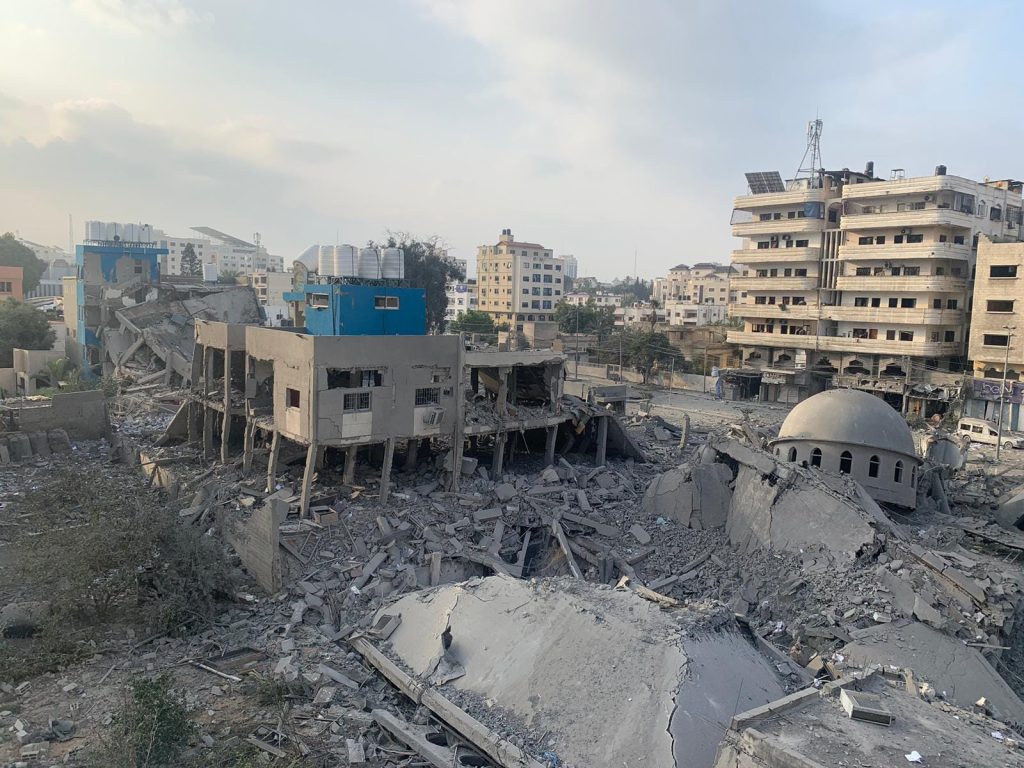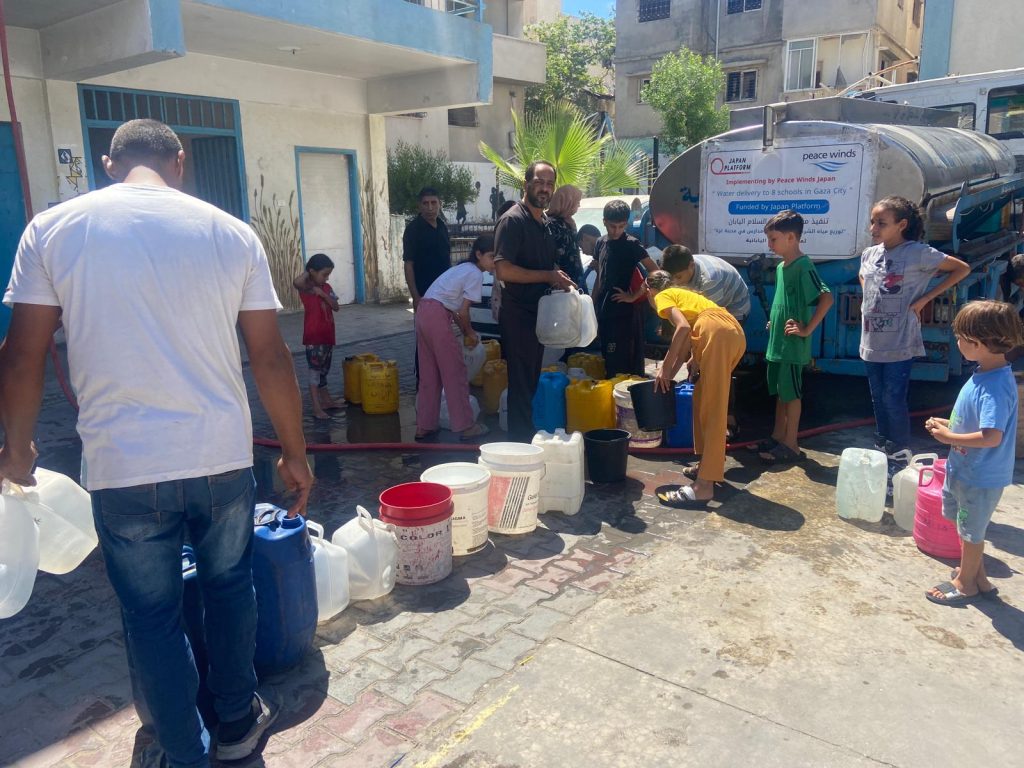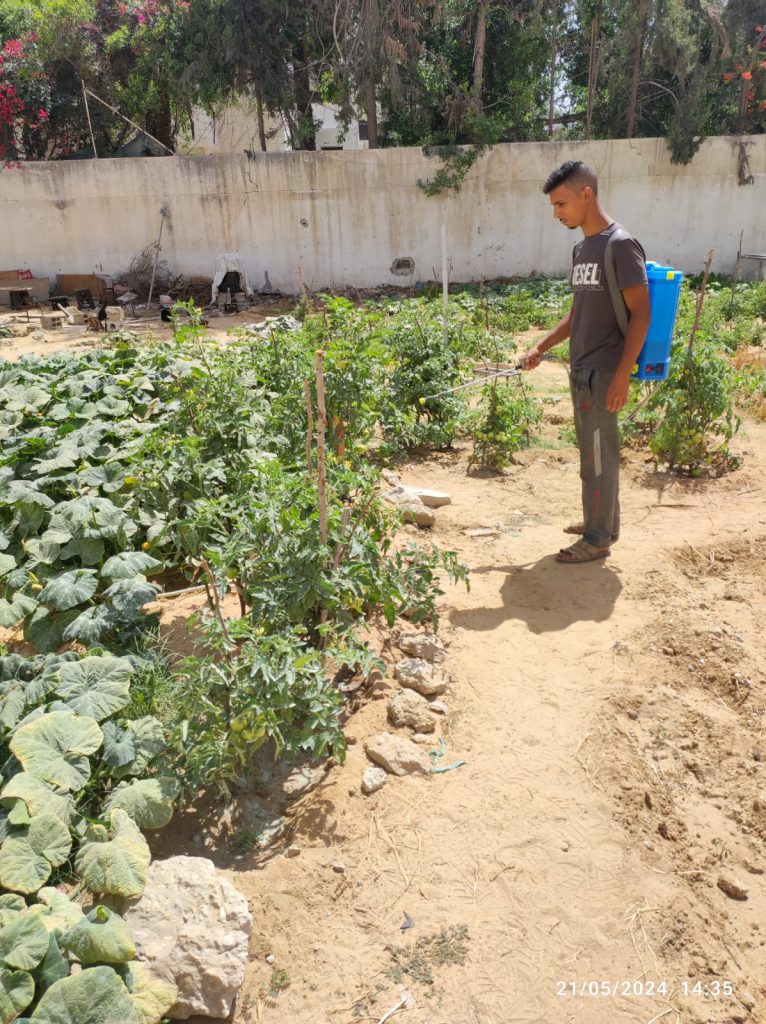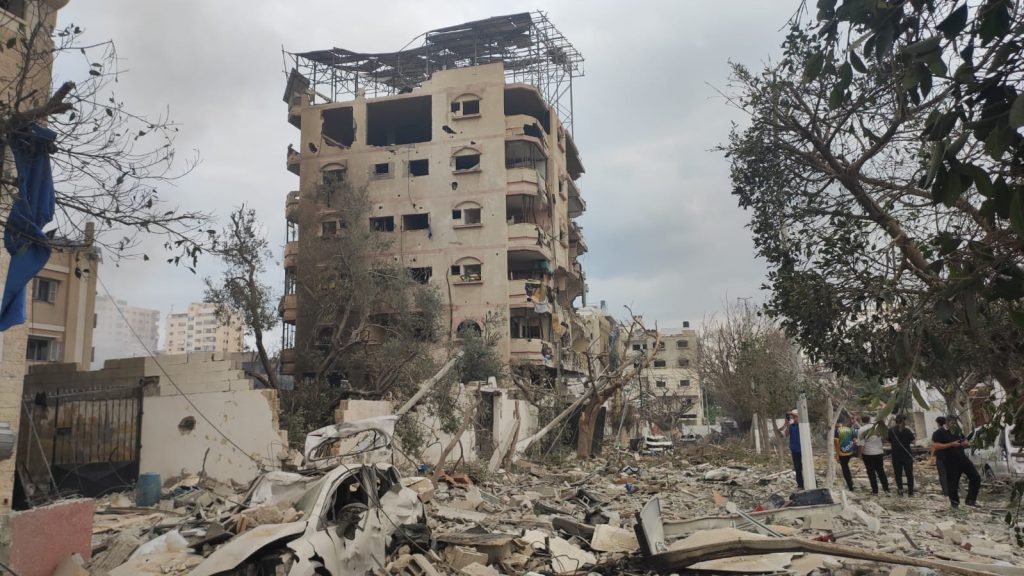One Year Since October 7: A Conversation on Peace Winds’ Gaza Response

This week marks one year since the Israel-Gaza war broke out, leading to horrific suffering for both Israeli and Palestinian civilians. More than 1,200 Israelis were killed and hundreds more taken hostage in the massacre on October 7. Israel responded with a relentless bombing campaign and ground operations in Gaza that have killed more than 41,000 people, including 16,500 children, and injured at least 96,000 men, women, and children, according to Gaza’s Ministry of Health. Peace Winds calls for an immediate, permanent ceasefire and the safe return of all of those held hostage.
Peace Winds has been working in Gaza since 2015, but over the last year, we have pivoted to providing emergency assistance to displaced residents in cooperation with partner organizations. Peace Winds staff inside of Gaza have been distributing food, drinking water, and hygiene products such as soap and diapers, while also providing cash grants to enable people with disabilities to meet their essential needs.
We spoke to Junko Utsumi, the Middle East Manager at Peace Winds, after her recent visit to the region, including a stay in Peace Winds East Jerusalem office, which remotely manages our work in Gaza.
When was the last time you visited Gaza?
Utsumi: Last year, I visited our humanitarian aid sites in Gaza two weeks before the Israeli attacks began. This is my first visit to East Jerusalem in almost a year, but I was not able to go into Gaza this time.
Many Palestinians live in East Jerusalem. How has the situation there changed?
Utsumi: Jerusalem is a holy place for Christianity, Islam, and Judaism, so it used to be bustling with tourists, but the number of tourists dropped dramatically after the war began. I could feel firsthand how difficult the economic situation has become. There are fewer staff at the guesthouse, and the taxi driver I used to know here has taken a different job because the tourists and NGO staff have disappeared. It seems that many Palestinians who were employed by Israelis have quit their jobs or been fired, and there is an influx in workers coming from China and Africa.
At the Tel Aviv airport, I was struck by a series of posters in the corridor leading to the passport control counter that featured the faces of each hostage with the message, “Bring them back.” I remembered previously seeing a poster in Gaza featuring the faces of children killed in Israeli airstrikes, and I had mixed feelings, thinking that both were doing the same thing, and that the feelings of those who had lost loved ones were the same.
What do Peace Winds’ current activities look like in Gaza?
Utsumi: One is a water supply project. Our tanker trucks are delivering water to schools that are being used as evacuation centers. Most of the desalination facilities that convert seawater into fresh water have been destroyed, making it difficult to obtain fresh water, so we deliver water to tanks in facilities where evacuees are living.
Our other project involves distributing food and hygiene products. We buy locally-grown vegetables from farmers and food items such as olive oil from stores that are still open, package them, and distribute them. (Note: Peace Winds’ focus on supporting and distributing locally produced food is intended to strengthen local capacity and alleviate the unpredictability and inflationary impact of food supplies that are trucked across the border.)
The people who fled the bombing without anything have no money and no jobs in the places where they’re sheltering. Even if they had an income, it would be very difficult to buy anything because prices have soared. Apparently a single egg costs almost US$3.

Are there many dangers involved in distributing supplies?
Utsumi: Of course. We are taking safety into consideration. We have had to change locations because the planned distribution areas were hit by an airstrike. Peace Winds staff stationed in Gaza and people from local partner organizations are delivering supplies to people with the utmost care.
What is daily life like for the staff?
Utsumi: While in East Jerusalem, I spoke with Samira, one of our staff in Gaza, on the phone. There are frequent power outages, airstrikes, and ground troops surrounding her house, so we can’t always talk on the phone. She calls when she thinks it’s okay, but our calls are often cut off in the middle of the conversation. My colleagues based in the Jerusalem office also sometimes “meet” with partner organizations through phone calls and text messages.
I asked Samira about her daily life, and because she can’t get food, she and her husband and children only eat two meals a day, lunch and dinner. They can’t have breakfast. She grows tomatoes and eggplants in the vacant lot in front of her house, but they are sometimes crushed by tanks, stolen, or do not grow well due to the lack of water.
Since the children have not been able to go to school for over a year, they are being taught at home. When there is no bombing, she tries to go up to the roof to get a signal to download materials for online classes, but sometimes the signal is cut off, and she can’t download what her children need.
Samira says that she is often unable to sleep because of the sounds of bombing and artillery fire that continue all night. She had sent me videos before, so I thought I knew what her life was like, but when I spoke to her directly over the phone, I was left speechless. And yet people still say that she is “blessed” to be able to stay with her family in her home, even though some parts of it have been damaged by airstrikes.
On the other hand, I heard another Palestinian who envies those who live in evacuation centers, saying “They are fortunate to be in evacuation centers because they receive a lot of aid supplies.” The situation is dire on both sides, but these are the kinds of things people in Gaza have to think about.

What kind of work in Palestine were you involved in last year?
Utsumi: I have been involved in Palestine projects since 2019. Gaza has always had problems with electricity shortages which impact people in many areas. So last year, we installed solar panels in informal educational facilities such as schools for children with disabilities and tutoring facilities. We also provided dozens of computers, and we worked on a project to implement modern computer-based learning, such as visual aids for deaf children and lessons using videos for biology classes.
We had just finished installing the solar panels and were about to create a learning program with the teachers when the war began. Before that, we had been working with the people of Gaza to help youth with vocational training and provide internships so they could gain work experience, we provided direct cash assistance, and we provided nutritional guidance and psychological support to kindergarten children.
The people of Gaza are very sincere and hardworking. I have always felt that they were amazing people who could have been more powerful and built a proper society if they weren’t forcibly oppressed and confined behind walls, so I thought that if the occupation were to end, they would surely have a bright future.
Have the schools and solar panels been destroyed?
Utsumi: We haven’t been able to check everything, but we confirmed that the solar panels in at least one of the three schools where we were organizing educational activities have been destroyed. I’m sure the other two schools have also been destroyed.
Have you ever had the experience of having something you’d built up get destroyed like this?
Utsumi: This was a first. As a humanitarian NGO, we usually provide support after something has happened, such as a conflict or disaster. This was my first experience seeing something we had built being destroyed right before our eyes. It’s unfortunate that the things we helped support were destroyed, but there’s nothing we can do. It’s a lot more painful to see the reality of all the lives that continue to be lost.
I heard the words “enough is enough” spoken by Palestinians in East Jerusalem, and they have stuck in my mind. After a year of destruction to their city, families and friends torn apart, and the loss of loved ones, I have had enough. I have heard them say, “Stop.”
It’s painful just to hear about it. In addition to overseeing Peace Winds programs in Palestine and Syria, you are also in charge of support for Ukraine as the Central Europe Manager as well as support for Türkiye’s earthquake recovery programs, which support victims that include many refugees who fled from Syria. Ukraine, Syria, and Palestine all seem to be caught in an unending cycle of war. What do you think about when you’re working?
Utsumi: What I feel most strongly is that once a war starts, it cannot be stopped. I truly understand that. So we must do what we can to stop war from starting in the first place. With that in mind, I am now working to help those in need.
Thank you very much.
Peace Winds’ food distribution activities in Gaza are made possible by the Japan Platform as well as contributions from individual donors. While Peace Winds America has not been actively fundraising for this program, individuals who wish to contribute to relief efforts for Palestinians can do so on our website by designating the donation to “Gaza” in the dropdown menu.
